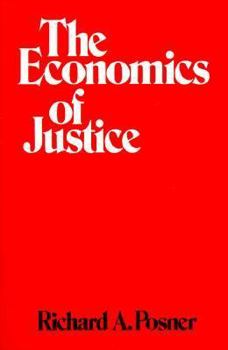The Economics of Justice
Select Format
Select Condition 
Book Overview
Richard A. Posner is probably the leading scholar in the rapidly growing field of the economics of law; he is also an extremely lucid writer. In this book, he applies economic theory to four areas of interest to students of social and legal institutions: the theory of justice, primitive and ancient social and legal institutions, the law and economics of privacy and reputation, and the law and economics of racial discrimination.
Format:Paperback
Language:English
ISBN:0674235266
ISBN13:9780674235267
Release Date:January 1981
Publisher:Harvard University Press
Length:432 Pages
Weight:1.40 lbs.
Dimensions:1.2" x 6.2" x 9.3"
Customer Reviews
2 ratings
Wealth Maximization. Holy cow!!!
Published by Thriftbooks.com User , 22 years ago
Although denied by the author in his book 'Problems of Jurisprudence,' Richard Posner was an integral early pioneer in the movement known as 'Economics and Law.' Picking up where George Stigler and Gary Becker left off, Posner argues that not only human behavior, but law can be understood by the theory of wealth-maximization. This is the philosophy that individuals act in a way that will maximize their benefit (the results of their action) while minimizing cost (energy, time etc. expended in action.) While my review is necessarily simplified, Posners audience is in for a well-made case.After his case is made, he moves on to offer a hypothesis of how law may have developed in primitive societies against this backdrop of wealth-maximization. I've read several authors attempts to 'create' a state (Rousseau, Locke, Nozick) and to my eyes, Posners is the most convincing. Let's see what you think!The third section applies wealth-maximization to privacy and discrimination laws. It is here that Posner is the most likely to disturb. For example, he distinguishes between privacy as seclusion and privacy as secrecy. Privacy as secrecy, Posner argues, is not only inconsistent with constitutional text but is not much more than the right to be able to distort information (whether by omission or declaration) to present and future transactors. This, in turn, distorts the 'market-place' of information and is inconsistent (a slippery slope) with the wealth-maximization of society. Whether you agree or disagree with Posner, his intellect is undeniable, his thesis, original and his writing, first rate. Should be read by anyone interested in jurisprudence, politics, economics and psychology.
Philosophy and Economics
Published by Thriftbooks.com User , 25 years ago
Posner's "Economics of Justice" is still a fascinating read, almost two decades after its first publication. In particular, the first half of the book, which attempts (I think quite successfully) to carve out a middle ground of "ethical wealth maximization" between the 'poles' of Kantian ethics and utilitarian thought, is quite good. I am not always convinced that wealth maximization as a juridical norm in fact escapes the strictures and failures of utilitatarian thought, but Posner's philosophy and economics approach to the law demonstrates quite conclusively that economic thought has much to say about issues of justice. More broadly, Posner's lucid arguments dispel some of the many myths and critiques (some by people who do not understand economics) which contend that economics either oversimplifies or commodifies too much of human experience. What is needed is an update to this work, and more generally, a stronger outpouring of philosophical explanation from other economics-minded scholars such as Posner, to respond to the many socio-cultural legal critiques of law and economics. Overall, though, an excellent read; and although one need not agree with all of Posner's conclusions, the ideas are well worth examining.






